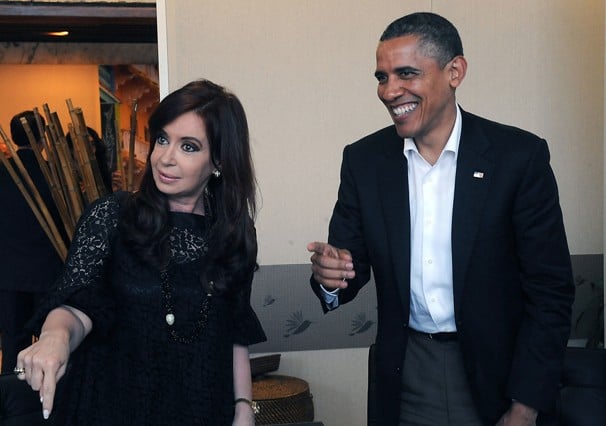
U.S. President Barack Obama and Argentina President Cristina Fernandez Kirchner at the Summit of the Americas. Photo credit AFP/Getty Images
While democracy struggles to take hold in Myanmar and the Maldives, last weekend’s Summit of the Americas in Colombia raised some interesting questions about development and democracy in the Western Hemisphere. Events at the conference itself have been addressed elsewhere in FPA blogs (and here); I’d like to examine what the conference indicates about the relationship between the long-dominant democracy in the Americas–the United States–and the “up-and-coming” nations to the south. Development on multiple fronts in Central and South America in recent years has caused some to question how much of an influence the U.S. still has with its neighbors.
In a manner of speaking, the Americas have come a long way from the Monroe Doctrine. That mantra, in essence a warning to any world power to avoid getting involved in any affairs in the U.S.’ backyard, held firm for well over a century. If you looked at development from any angle–economy, society, democracy/government–the U.S. was the undisputed leader, with everyone else lagging far behind. Whenever another country tried to get out from under the thumb of a merciless dictatorship, the U.S. was invariably involved in some capacity; granted, many of the leaders/regimes that replaced the dictators weren’t much better.
Today, this is no longer the case. Other countries in the Americas have closed the gap considerably with the U.S. Just the fact that the Summit of the Americas took place in Colombia–a country overrun by violence and corruption not even 20 years ago–is remarkable. It has made significant strides in terms of wresting control away from drug cartels (though notably Colombia received billions of dollars worth of U.S. aid to help with this), growing the economy and specifically the middle class, and stabilizing the government: all indications of a developing democracy.
Many Central and South American countries have made notable improvements in the last few years in terms of economic development. While the U.S. economy has floundered since the 2008 financial crisis, other countries in the region followed a steady course of growth. Political and economic strength have led to taking a more vocal stand on certain issues. At the Summit Colombia President Juan Manuel Santos questioned whether the U.S., in its mishandling of its economy, is “exporting unemployment” to Latin American countries. Several regional leaders are questioning the efficacy of U.S. drug policy. Such bold criticisms would have been unthinkable even 10 years ago.
Perhaps most surprising is that the U.S., pretty clearly, is not the undisputed leader of the region anymore. A report by the Inter-American Dialogue, a Washington DC policy group focused on Western Hemisphere issues, makes the following stark conclusion: “Brazil is now Latin America’s dominant economic power. Its influence in regional affairs, especially in South America, rivals that of the United States.” What’s more, “Latin America and the Caribbean have formed several new regional groupings in recent years… and the most significant of the new organizations have tellingly excluded the United States.”
What has helped drive the region’s growth and reduced need to rely on the U.S. for help? The steady influence of democracy. There are certainly exceptions–Honduras, Nicaragua, Peru among others–but the Inter-American Dialogue report (which you can read here) points out, “Most Latin American countries are turning toward centrist, pragmatic politics that are directed at economic growth, social progress, and democratic governance.” Tellingly, these advances in government and democracy (look especially at Chile and Brazil) have occurred largely outside the influence of the United States (at the Summit Obama acknowledged criticism that the U.S. hasn’t done enough to promote democracy in the Americas).
There’s no question that the U.S. finds itself in a different position vis a vis its neighbors than in the past. Being able to accept and utilize the increased stature of countries like Brazil and Colombia will be key in ensuring stability in the region. Whereas before most countries in the Western Hemisphere deferred to the strength of the U.S., now several countries can be leaders, and all countries must be active partners in building a stronger, better Americas.